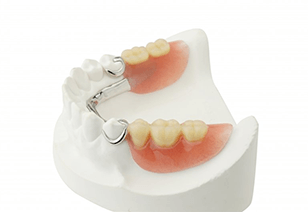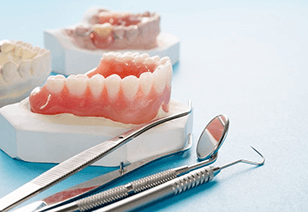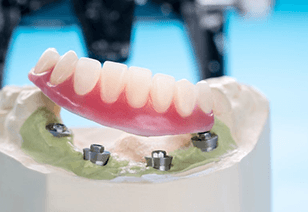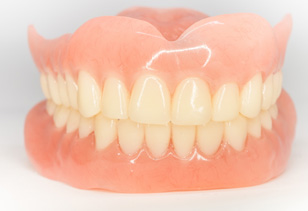Dentures – New Braunfels, TX
Lifelike Materials, Brand-New Smile

Struggling with moderate to severe tooth loss? If so, dentures may be the ideal solution for you. With these custom-made prosthetics, you’ll be able to renew your full smile, allowing you to regain your ability to eat comfortably and speak clearly. At Gruene Family Dental, we offer durable and natural-looking materials, meaning your new pearly whites can look and feel just like your natural ones! Keep reading to learn more about dentures in New Braunfels or give us a call to schedule your consultation.
Why Choose Gruene Family Dental for Dentures?
- Custom-Designed & Durable Dental Materials
- Professional & Friendly Dental Staff
- Utilize State-of-the-Art Technology
Who's a Good Candidate for Dentures?

Usually, dentures are reserved for patients who are missing some, most, or all of their teeth. If that describes you, then take the next step: schedule a consultation with us so we can determine what the best tooth-replacement solution is for you! In the meantime, you can read on to learn a bit more on the topic, including what qualities we look for in a good denture candidate.
Effects of Missing Teeth

Even more minor cases of tooth loss can lead to serious trouble – from low self-esteem and difficulty speaking clearly to struggling to chew and nutritional deficiencies. That’s why we don’t recommend taking the “wait and see” approach. Instead, schedule an appointment with us to explore your treatment options, even if you are only missing one tooth that no one can see. The sooner you visit us, the sooner we can address any existing oral health problems and fill the gaps in your smile.
What Qualifies You for Dentures?

In order to determine if dentures are right for you, we need to confirm that your gums are healthy, that any remaining teeth you have are healthy, and that your jawbone is dense enough to support your dentures. If you’re experiencing any complications, like gum disease, decay, or an infection, don’t worry – we can address them before going forward with your denture creation process. Otherwise, we will simply proceed with determining which type of denture is best for you!
Alternative Tooth-Replacement Options

In addition to providing you with further details on dentures at your consultation, we will discuss the other tooth-replacement solutions available. For example, if you are missing several teeth in a row, we may recommend a dental bridge to seamlessly fill in the open space in your smile. If you are missing an entire arch of teeth, then a denture secured with a few strategically placed dental implants might be the best way to give you back the smile you’ve been missing.
Rest assured, we will provide you with helpful information and our recommendations at your appointment. We will also answer any questions you have about your treatment options so you can confidently decide the best way to move forward. In other words, we’re here to help make the entire process as smooth and stress-free as possible, so don’t hesitate to get in touch with us to schedule a consultation!
Types of Dentures

These lifelike prosthetics come in a variety of shapes and sizes, which allows us to tailor yours to fit exactly what you need. Once we’ve evaluated your mouth, we can determine the kind of denture that will meet your smile goals.
Partial Dentures

Partial dentures offer a reliable solution to people who are missing only some of their pearly whites. This prosthetic is made up of a gum-colored base that has a metal framework within which will fit between existing teeth like a piece of a puzzle. Even if you have multiple locations that are separate from each other, a single partial denture for each arch will suffice.
Full Dentures

This is the most popular kind of denture, which is designed to replace an entire arch of missing teeth. The prosthetic will rely on the natural suction of the gums to remain steady, but you can also use a tiny amount of denture adhesive if you need extra support.
Implant Dentures

Our team can first help embed titanium posts into your jawbone that will directly anchor your dentures. Once the dental implants have fused properly, you’ll be able to expect an incredibly stable foundation that can last decades or a lifetime with proper maintenance.
How Dentures are Made

Your new dentures will play an important role in your everyday life, so naturally, a lot of care will be put into creating them so that they fit and function properly. Our team highly values patient education, so we’re more than happy to take the time to help you learn more about what it will take to create natural-looking, reliable dentures for your unique smile. Read on to learn more about the process of creating dentures!
What are Dentures Made Of?

Making a reliable prosthesis starts with picking the right kinds of materials. When it comes to the base of the dentures, acrylic is typically used due to how well it can blend in with the gums. Note that with partial dentures, the acrylic base may also include clips made out of metal. Said clips are necessary for ensuring that the prosthesis stays in place.
The teeth of the dentures can be made out of porcelain or resin; both of these materials can be shaded to match the appearance of your natural teeth. That said, porcelain is generally used more often due to its durability.
The Denture Creation Process

No two mouths are exactly the same, so before the process of making your dentures can begin, our team will need to capture impressions of your oral cavity. This will allow us to create a model of your mouth in order to determine what size and shape your dentures need to be.
Once the model of your mouth has been sent to a dental laboratory, the denture creation process can move forward. This involves the following steps:
- A wax replica of your gums will be created to serve as the temporary base for your dentures.
- An appropriate number of artificial teeth will be attached to the wax base using a device called an articulator.
- The dentures will be sent to our office, and a fitting appointment will be held. We’ll confirm whether the dentures fit properly inside your mouth. Then we’ll return the prosthesis to the lab.
- The dentures will be placed into a small flask, which will subsequently be filled with plaster. Then the wax portion of the dentures will be melted away by placing the flask in hot water.
- Once the wax base is gone, acrylic will be injected into the flask to serve as the new base for the dentures. A liquid separator will be used to stop the acrylic from sticking to the plaster.
- The newly completed dentures will be taken out of the flask. An ultrasonic bath will be used to get rid of any leftover plaster, and unnecessary acrylic will be trimmed away.
- The dentures will be sent to our office one last time. At this point, you’ll be ready to receive your new prosthesis at a final fitting appointment.
Adjusting to Your New Dentures

You’ll eventually reach the point where your dentures feel similar to your natural teeth. But before that, you may experience some mild soreness during the initial adjustment phase. Also, it can take a while to get completely used to eating and speaking with your prosthesis. Fortunately, our team can give you tips to make the adjustment process easier. For example, we often recommend sticking to soft foods that are easy to chew.
The Benefits of Dentures

Dentures come with a multitude of advantages for you and your oral health. Some of the most essential ones include:
- Preserves the position of other teeth
- Regained chewing ability
- Improved speech and enunciation
- Supports facial shape and muscles
- Simple to maintain and clean
- Boosts self-esteem